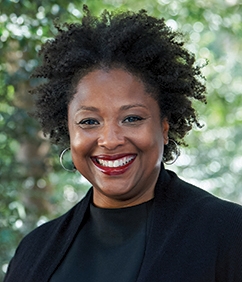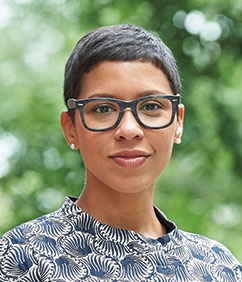In Jacob K. Javits Professorship Lecture, Deborah Archer and Melissa Murray consider democracy, inequality, and civil unrest
Professor of Clinical Law Deborah Archer and Frederick I. and Grace Stokes Professor of Law Melissa Murray, co-recipients of the 2021 Jacob K. Javits Visiting Professorship at NYU, engaged in a discussion titled “Democracy, Inequality, and Civil Unrest” for the 2020-21 Jacob K. Javits Professorship Lecture on March 30.
The virtual conversation, moderated by Dean Trevor Morrison, brought together two leading legal minds. Archer, an expert on civil rights, civil liberties, and racial justice, is faculty co-director of NYU Law’s Center on Race, Inequality, and the Law and director of the Civil Rights Clinic; she was recently named president of the American Civil Liberties Union. Murray, faculty director of the Birnbaum Women’s Leadership Network, is an authority on family law, constitutional law, and reproductive rights and justice.
Javits, who graduated from NYU Law in 1926 and went on to serve as New York attorney general and as a member of both the US House of Representatives and the US Senate, was a liberal Republican who had grown up in a Lower East Side tenement. While in Congress, he supported unions, the National Endowment of the Arts, and an end to the Vietnam War, and fought against poll taxes, segregation, and the House Un-American Activities Committee.
Archer said that Javits’s personal story resonated with her. His journey from humble beginnings to the halls of power, she suggested, embodied the American dream, “that notion that everyone deserves a fair shot at a better life and the idea that education and investment in a child could transform that child’s life and trajectory.” Archer, a first-generation American born to Jamaican immigrants, was the first person in her family to graduate from college.
Murray, too, is the daughter of Jamaican immigrants, and the first member of her family to attend law school. Contemplating what might have happened if a pandemic had forced her to miss a year of in-person education, as has happened to many public school students recently, she expressed uncertainty as to whether she would have had the same level of success in her career. The “digital divide” that made it more difficult for children from less advantaged households to keep up with school during the COVID-19 pandemic has exposed long-existing inequities, Murray said, so that Americans finally could see that “what we have generally thought of as merit or achievement is really just about the compounding of advantage.”
The conversation’s topics included the challenges of political polarization, recent voter suppression efforts, systemic racism, how infrastructure and transportation policy intertwine with racial justice, the ongoing crisis of police violence, current existential threats to the democratic system, and the role law schools should play in addressing these problems.
Selected remarks from the event:
Murray: “I’m just reminded every day, just because we have such a diverse group of students at NYU, that you really don’t know where anyone is coming from, what their past was like, what their views are, and that their views are not necessarily fixed and they change over time. I’ve been delighted, teaching Constitutional Law at NYU, that I have students who have come to me like, ‘I thought you were going to be like a pinko Commie from Berkeley, and I was really surprised when you let us play out a whole range of different scenarios, and you never suggested that you viewed them as illegitimate or whatnot.’ I think that’s what we’re supposed to do as professors. The classroom is supposed to be a safe space. You cannot denigrate anyone in the classroom, but it is a place where you can exchange ideas, even ideas that you may not necessarily agree with…. I think it’s easier to understand where people are coming from if you meet them from a place of generosity.” (video 1:17:24)
Archer: “I think compromise is important, but I’m also challenged by the idea of compromise with some of the issues that we’re facing today, because so many of the disagreements are grounded in issues on which I just think there is no compromise. We cannot have a conversation if you don’t believe in my fundamental humanity, if you don’t believe in my right to live, exist, and thrive in the same way that you do. Yes, some of this has to be about compromise and some of this has to be about conversation, but I think it’s exhausting sometimes to have to repeatedly try to convince people that you’re as deserving as they are, to try to convince people to believe in fundamental issues of equality and access.” (video 1:18:41)
Watch the full video of the event:
Posted April 21, 2021



